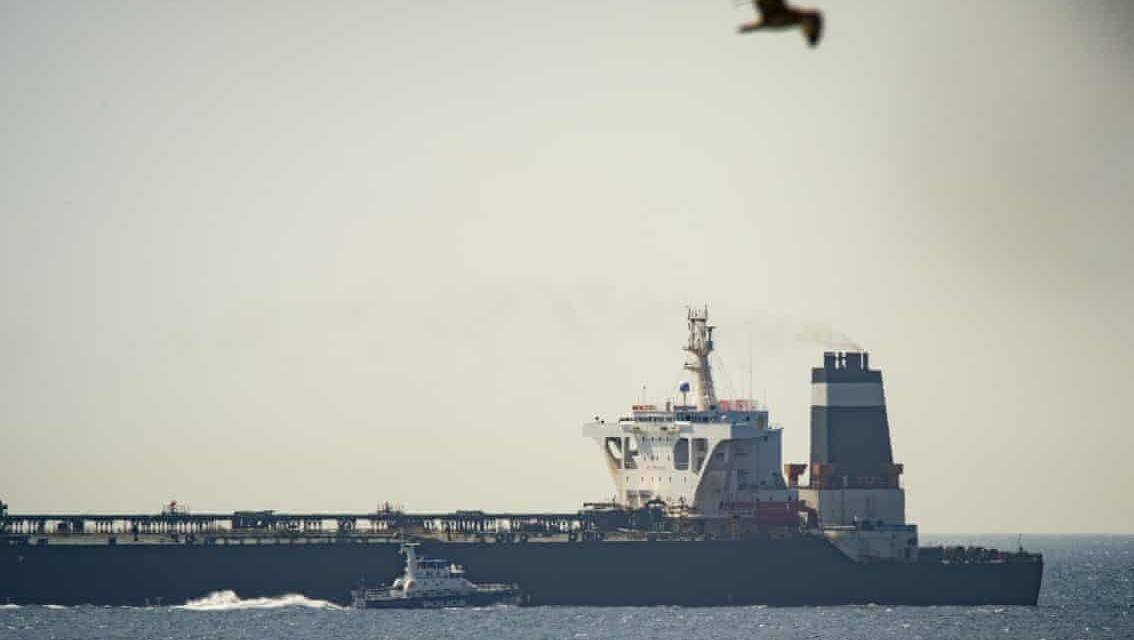The supertanker Grace 1, carrying Iranian oil and seized in Gibraltar’s waters
UPDATE 1230 GMT:
The Secretary of Iran’s Expediency Council has threatened the seizure of a British ship in retaliation for the impoundment of the Iranian supertanker in Gibraltar.
Rezaei, a former Revolutionary Guards chief commander and Presidential candidate, tweeted, “If Britain does not release the Iranian oil tanker, it is the authorities duty to seize a British oil tanker.”
انقلاب اسلامی در طول تاریخ چهل ساله خود، در هیچ معرکهای آغازگر تنش نبوده، اما در پاسخ به زورگویان و گردنکشان، تعلل نکرده و تردید به دل راه نداده است. انگلیس اگر #نفتکش_ایرانی را رفع توقیف نکند، وظیفه دستگاههای مسئول، اقدام متقابل و توقیف یک نفتکش انگلیسی است.
— محسن رضایی (@ir_rezaee) July 5, 2019
British military personnel and Gibraltar’s police have boarded and seized an Iranian tanker accused of breaking oil sanctions on Syria’s Assad regime.
Almost 30 Royal Marines and police officers moved onto the Grace 1, carrying about 2 million barrels of oil, early Thursday after it entered Gibraltarian waters at the mouth of the Mediterranean. Some of the marines from 42 Commando landed on the ship’s deck using ropes suspended from a Wildcat helicopter, and the rest came by speedboat.
Spanish authorities said Gibraltar acted in response made by the US to the UK.
Fabian Picardo, Gibraltar’s chief minister, thanked the “brave men and women” who carried out the operation:
This action arose from information giving the Gibraltar government reasonable grounds to believe that the vessel, the Grace 1, was acting in breach of European sanctions against Syria….
We have reason to believe that the Grace 1 was carrying its shipment of crude oil to the Baniyas refinery in [western] Syria.
The UK Foreign Office said, “We welcome this firm action by the Gibraltarian authorities, acting to enforce the EU Syria sanctions regime.”
Iran’s Foreign Ministry responded by summoning the UK ambassador over “its very strong objection to the illegal and unacceptable seizure”.
Tracking date indicated the Grace 1 was taking a lengthy diversion to try and avoid any interception. Rather than taking the direct route from Iran through the Suez Canal to Syria’s coast on the eastern Mediterranean, it traveled around the southern tip of Africa, moving up the Atlantic to the western mouth of the Mediterranean.
The supertanker is controlled by a Russian subsidiary of a Dubai-based shipping company. Executives connected with both firms hold Iranian university and technical qualifications, or list their names in Farsi.
The 28 crew, who were questioned onboard by Gibraltarian authorities, are mostly Indian nationals with some Ukrainians and Pakistanis.
The EU imposed the sanctions on the Assad regime soon after the start of the Syrian uprising in 2011, citing the regime’s violence, detentions, and torture in trying to repress the protests.
Regime-held areas of Syria have suffered serious shortages of oil and petrol, with long queues for supplies in areas such as the capital Damascus.
Syria Daily, April 19: Regime Areas Stalled by Petrol Shortages
The regime has blamed the sanctions, but Iran’s line of credit to the Assad regime — worth billions of dollars since 2012 — has been hindered by Tehran’s economic difficulties, including comprehensive US sanctions imposed on the Islamic Republic in November.
US National Security Advisor John Bolton, a hardliner who favors regime change in Iran, celebrated the news.
Excellent news: UK has detained the supertanker Grace I laden with Iranian oil bound for Syria in violation of EU sanctions. America & our allies will continue to prevent regimes in Tehran & Damascus from profiting off this illicit trade.
— John Bolton (@AmbJohnBolton) July 4, 2019


So, disrupting oil tankers are bad??? huh! I guess you reap what you sow.